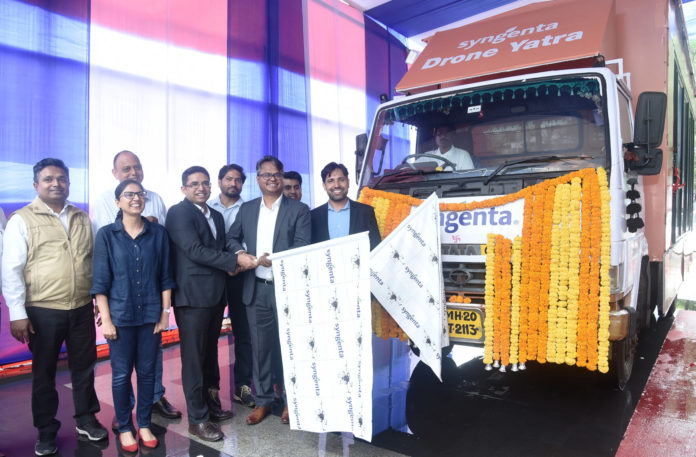Working with IIT Ropar & Fraunhofer Institute for Biodiversity Sensor Project
Crop sciences company Syngenta India on Friday(15 July) announced a unique Biodiversity Sensor Project, world’s first biodiversity monitoring technology, featuring a centralized, biodiversity data repository that can be shared and tracked, with the goal of accelerating the accuracy of biodiversity measurements across the planet.
Country Head & MD of Syngenta India Susheel Kumar and Chief Information & Digital Officer, Syngenta Group Feroz Sheikh announced this breakthrough Make in India innovation to tackle global agriculture problem. The two leaders also flagged off India’s first Drone Yatra, that will travel 10,000 kms to create awareness on drone spraying among 10,000 farmers. The Yatra will travel to 13 states to demonstrate and educate farmers on use of drones. Syngenta is first private company to get approval from Central Insecticide Board, Government of India to use drones for spraying of its product Amistar on paddy to protect the crops against fungal infections, Blast & Sheath Blight.
“Use of drones, and a host of other technology-led innovations, are in keeping with our commitment to help Indian farmers improve their yield, increase their profitability and grow more sustainably. For 94 years of our existence in India, we have been at the forefront of innovation, and served Indian farmers with quality crop protection products, seeds and solutions that are produced entirely in India for India.” said Kumar.
Kumar further informed, “We believe through partnerships with the best-in-class research institutions like Indian Institute of Technology we will be able to identify, develop and scale a series of innovative, breakthrough transformations in the agriculture sector. Through these partnerships with research and academia, we also wish to bring in young talents to pursue the field of agriculture which will enable the world’s farmers to increase yields while increasing environmental sustainability”.
For the Biodiversity Sensor Project, Syngenta India is working with IIT Ropar and Fraunhofer Institute. The initial phase of the biodiversity project will endeavor to identify and quantify insect life in and around farms – to better track and measure the population of insects that contribute to a healthy agriculture biosphere. “Eventually, we hope to broaden this technology to detect other habitats as well. Our first prototype is operational since March 2022. Throughout 2022, we will continue to hone and refine a small number of sensor prototypes and to further develop the artificial intelligence. And in 2023, we hope that the first sensor-network pilot projects will be implemented in selected countries,” informed Sheikh.
Sheikh added that the low-cost, solar-powered, state-of-the-art motion-capturing system would draw on artificial intelligence (AI) and machine-learning algorithms to identify and quantify all moving species – automatically, autonomously, reliably, and at scale.
Syngenta Global also announced a collaboration with IIT Ropar iHub – AWaDH. “We wish to work together in a collaborative manner to pursue the development and commercialisation of products in agriculture and water to solve global and local problems in agriculture,” informed Sheikh.
“We are happy to partner with Syngenta to contribute in designing technological solutions for farming community,” said Pushpendra P Singh, Associate Professor – Experimental Nuclear PhysicsDean, DST Technology Innovation Hub – AwaDH (Agriculture and Water Technology Hub) and Associate Dean (R & D). IIT Ropar and Syngenta will be engaging in future internship programs, research and develop new technologies and explore the grower problems in India, Singh added further.
Outlining other India-centric innovations, Kumar announced that Syngenta India will soon launch a Grower App that gives digital agronomy advice for nine crops including cotton, wheat, vegetables, rice and maize in multiple languages. It is a unique app, which digitally empowers small holders.
Kumar informed that “the Grower App will consist of a personalized crop calendar based on farmer’s sowing date, planting method, planting material, and soil nutrition status; weather-based advisory or alerts; nutrient recommendations; image-based disease diagnostic model; and an interactive community platform where farmers can share their stories and queries to be answered by experts.”
“The app is built using our Cropwise technology platform, and tailored to India, and with that we are bringing our global innovation in Artificial Intelligence and Machine Learning to create benefits for the Indian farmers,” informed Sheikh.
The App is working on including satellite imagery for identification of crop stress, stress indicator model as every crop needs a particular weather requirement at its different crop growth stages. The App will also map ideal weather conditions against the crop growth stage and compare them with concurrent climatic conditions. It will have recommendations on spraying of agrochemicals required for saving crops from pests and diseases according to the threats.

